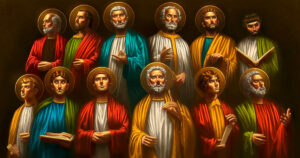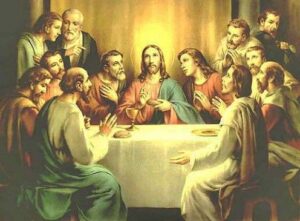Apostles of Christ – All Apostles were Disciples, but all Disciples were not Apostles.

“And it came to pass in those days, that He went out into a mountain to pray, and continued all night in prayer to God. And when morning came, He called unto Him His disciples: and of them He chose twelve, whom also He named apostles” (Lk. 6: 12, 13).
Our Lord and Saviour Jesus Christ chose twelve men to work with him in the establishment and growth of the kingdom. They were called ‘Apostles’. The word ‘Apostle’ comes from the Greek ‘apostolo’ – ‘to send forth’, or ‘to dispatch’. The word ‘Apostolos‘ (Apostle) thus, means the one who is send forth, dispatched or the one who is entrusted with a mission, or a representative charged with a commission.
The Greek word Apostolos can be considered the New Testament counterpart to the Hebrew word ‘Saliah’, which distinguishes the Old Testament emissaries, as Moses (sent to the Pharaoh; Ex. 6: 10) and Elijah (sent to Ahab; 1 Kings 18: 1). Christ is the Apostle of God (Mk. 9: 37; Heb. 3: 1) and maintains that “he who receives anyone whom I send, receives Me“. (also Jn. 13: 20 ff.; Matt. 10: 40). It seems that there is no doubt that the Aramaic word ‘seliah’ would be the exact rendering of the root ‘saliah’ to mean apostelo. In the New Testament the word is used 80 times and often does not denote all the disciples of our Lord, but some specially called ones. So is obvious that Jesus Christ, who spoke an Aramaic dialect, gave some of his disciples an Aramaic title, the Greek equivalent of which was ‘Apostle’. In a Christian sense, everyone, who has received a mission from God or Christ, could be called an ‘Apostle’. However, it is reserved to those of the disciples, who received this title from Christ and denotes principally one of the twelve disciples who, on a solemn occasion, were called by Christ to a special mission.
In the Gospels, however those disciples are often designated by the expressions of ‘mathetai’ (the disciples) or ‘dodeka’ (the twelve) and after the treason and death of Judas, even as ‘hendeka’ (eleven). The word disciple however, is derived from the Latin ‘discipulus’ as opposed to master (scholar/teacher). A disciple is a pupil or one who learns, and the word “apostle” means one who is sent.
In the N. T. the word apostle and disciple, is most especially applied to and sometimes styled to mean the ‘chosen Twelve’ (Matt. 10: 1; 11: 1; 20: 17; 26; 20). Matt. 28: 16 refers to ‘eleven disciples’. Sometimes the chosen ones are merely called ‘the disciples’ (Matt. 14: 18; 15: 33,36). Occasionally this term is used for a ‘believer’ or ‘followers of Christ’ both men and women (Acts 6: 1, 2, 7; Acts 9: 1, 10, 19), other evangelists like Barnabas (Acts 14: 4, 14); Epaphroditus (Phil. 2: 25); Andronicus and Junias (Rom. 16: 7) etc.
The disciples are also ascribed the term ‘the Saints’. In Philipp. 2: 25 we read of Epaphroditus, who was called the messenger of the Church in Philippi. In the Greek text he is called an apostle, not because Jesus chose him, but because the congregation in Philippi sent him on a mission to take goods to St. Paul. Concerning the apostles and disciples of Jesus, we must understand that all apostles first became disciples before they were chosen to be apostles (Luke 6: 12, 13), and that is why sometimes the original twelve apostles are called the ‘twelve disciples.’ All apostles were disciples, but all disciples were not apostles. This is similar to the situation under the Law of Moses whereby all priests in Israel were Levites, but all Levites were not priests. How do we know that not all disciples or members of the Church were apostles? From the rhetorical questions of the apostle Paul: “Are all apostles? Are all prophets? Are all teachers? Are all workers of miracles?” (1 Cor. 12: 28, 29). Through Paul the Holy Spirit also said that Jesus “gave some, apostles; and some, prophets; and some, evangelists . . .” (Eph. 4: 11). Obviously not all were apostles. The names of the twelve or in one case eleven are recorded in four places in the New Testament. – Mark 3: 16-19; Matt. 10: 2-4; Luke 6: 14-16 and Acts 1: 13.
An apostle and a Disciple
A disciple is a pupil, or one who learns. The original twelve apostles are called the “twelve disciples.” A true apostle of Jesus Christ was a disciple whom Jesus personally appointed as an apostle. True apostles did not select themselves to be Jesus’ apostles, nor were they chosen by a group of men or the Church. The Bible specifically says that Jesus chose and ordained the twelve (Lk. 6: 13; Mk. 3: 14), the Lord chose Matthias through the casting of lots (Acts 1: 24, 26; Prov. 16: 33), and Jesus called Paul “a chosen vessel unto me” (Acts 9: 15). The Holy Spirit set apart and called, Barnabas as Apostle (Acts 13: 2, 4).
And He ordained twelve, that they should be with Him, and that He might send them forth to preach, And to have power to heal sicknesses, and to cast out devils (Mk. 3: 14, 15). When Jesus was still living on the earth the apostles were in a special period of training, learning from Jesus as they daily saw His perfect example and heard how He taught others. Jesus knew that He would one day leave this earth and return to heaven, so He chose the apostles to serve as His ambassadors to continue His work on earth after His departure (2 Cor. 5: 18-20). Jesus had a much greater plan for them. He wanted them to go preach the gospel to every person in the world (Mk. 16: 15), being witnesses unto Him in Jerusalem, and in Judea, and in Samaria, and unto the uttermost part of the earth (Acts 1: 8). Jesus was gathering disciples right from the start of His ministry. He was gathering hearers, who would later be preachers. He was appointing Ushers. He was setting up a school of Christianity. Jesus started this school by selecting & appointing 12 disciples as Apostles. He called them to make those fishermen, fishers of men. He called and separated them, so that they fitted and qualified to learn Christ, to acquaint themselves with Christ and Preach Christ.
The origin of the apostolate lies therefore in a special vocation, a formal appointment of the Lord to a determined office, with connected authority and duties. The appointment of the twelve is given by the three Synoptic Gospels nearly in the same words, so that the three narratives are literally dependent. The holders of the view that special apostleship is not only for the twelve but also for all disciples or are not for a crowd of believers who flocked around Christ but for a small band of His followers. And when it was day, he called unto him his disciples; and of them he chose twelve, whom also he named apostles; (Lk 6: 13)Christ selected only twelve which was the number of the twelve sons of Jacob, who later became the twelve tribes of Israel. After Pentecost Christ’s chosen twelve disciples became the leaders of the New Israel. The number twelve was considered important, that very shortly after the falling of Judas Iscariot the remaining eleven voted a new Apostle Matthias.

The New Testament gives us an intimate and detailed account of the Twelve and their experiences with Christ and later. However, the Bible abruptly ends without any additional information pertaining to the lives of the 12 disciples. The last known Biblical references to these men leaves us to the following conclusions: Peter becomes a leader of the Church in Jerusalem. John was exiles to the island of Patmos and writes the Book of Revelations (Rev. 1: 9). James, brother of John was the first disciple to be martyred (Acts 12: 2). Andrew and Philip were two of the several to inform Jesus about the Greeks wanting to see Him (Jn. 12: 22). Bartholomew and Thomas are seen last in the boat in the Sea of Tiberias (Jn. 21: 2). Matthew wrote a Gospel. James, son of Alphaeus, Thaddaeus and Simon the ‘Zealot’ are merely mentioned in the lists as disciples. Judas Iscariot commits suicide (Acts 1: 18).
What happened to them? What countries they did visit? What Churches did they establish? Where did they live? How long did they live? Where did they die? Where are they revered? These and many more questions will be the focus of our study, even though extra-biblical information is somewhat obscure, limited, legendary and fictious. However reputable sources of eyewitness accounts, narratives and testimonies are available. Tertullian, Eusebius, Origen, Irenaeus and Clement of Alexandria provide much light on the life of the twelve. The aim of this series is to assemble all that the New Testament talks about the twelve apostles and to add to that interesting information and significant traditions that have come down to us. An Apostle is a missionary, bearing the testimony of reality and divinity of Jesus Christ in the world.
All Apostles had no gold, but lots of Glory. We have lots of Gold but no glory.

0 Comments